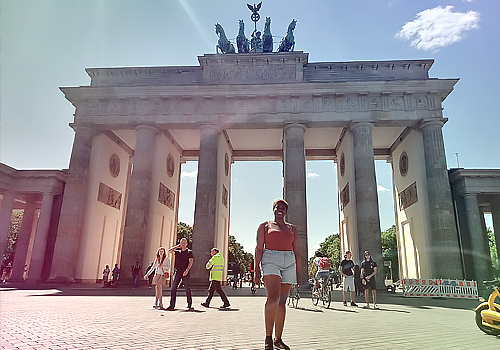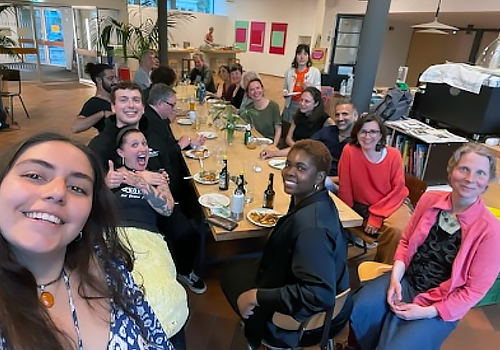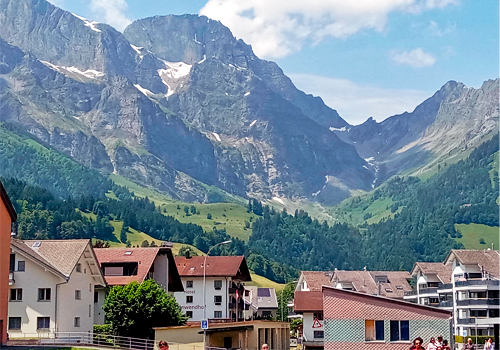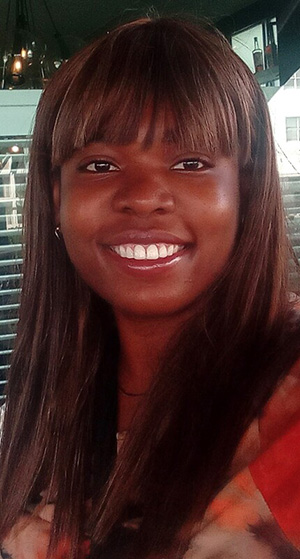You wouldn’t expect to learn about sustainable urban development and social equity initiatives working as a barista, but that’s exactly what happened to Shantel Watson.
Watson, a fourth-year student and a member of New College with a double major in international relations and German studies, spent six weeks in Freiburg, Germany this past summer as part of her iPRAKTIKUM internship through the Department of Germanic Languages & Literatures.
iPRAKTIKUM is an experiential learning initiative that helps students find impactful internships that promote global fluency and cultural competence. Open to all students at U of T, placements are available at local schools and businesses in Toronto and Germany.
“I wanted to do this because I really wanted to improve my German,” says Watson. “I didn't have the confidence I wanted when having conversations in German and I wanted to get to the level of comprehension that's needed for that.”
The internship also ticked a few other boxes for Watson — it was her first time doing international course work, as well as her first time visiting Europe.

While in Freiburg, Watson worked at the Zuka Solicafé, which is part of the Zusammenleben — a community organization with a variety of social projects designed to bolster sustainable urban development. (The word Zusammenleben translates to “live together harmoniously.”)
Watson worked several roles in the café, primarily as a barista and a server, speaking German to her colleagues and customers.
“I was constantly interacting with people,” she says. “It really helped me to immerse myself in the culture and the language.”
The experience dramatically improved her German, though Watson admits she used the odd English word when she got stuck.
“Thankfully the customers were very understanding and patient,” she says. “Sometimes if they saw me struggling, they would help me figure out the right words and grammar.
“And this work environment is designed to help people with German as a second language so there wasn't pressure to know all the words off the bat. I had a chance to build gradually. When I came back, I realized just how much I had improved.”

Just as rewarding, Watson also benefitted from seeing the café’s many social equity programs in action. It was a hub of activities that promoted diversity and inclusion.
For example, the café offered a “pay what you can” pricing system, making it easier for customers who were financially struggling to enjoy the café’s menu.
The café also promoted locally sourced food products and managed a small organic garden for its food supply, offering workshops on organic gardening. Another program gave young entrepreneurs the chance to showcase their international food products. “They were given a platform to let people try their food and present their mission and objectives,” says Watson.
Another program focused on helping new immigrants to Germany learn the language and develop basic work skills. There were also arts-based events, with the café hosting movies from filmmakers from around the world.
The group’s internship program for students with disabilities was especially meaningful for Watson.
“Someone very close to me has a developmental disability so it was good to see the investment in students to help them develop skills and give them the chance to be further integrated,” she says.

The internship wasn’t all work. Watson managed to find the time to visit some local sites such as hiking trails around Freiburg, the University of Freiburg Botanical Garden, and a day trip to the Alps in Locarno, Switzerland.
Through her work at the café and exposure to its various initiatives, Watson connected with expats from around the world, including Gambia, Syria and Pakistan. She also met locals, including a grandmother named Ursula, who invited Watson to come to Berlin to visit her family home.
“She didn't speak much English, so I really had to try with my German to communicate with her,” says Watson. “I was able to visit Berlin thanks to her. She showed me around and told me stories about her mother's experience during the Second World War.”
Back on campus, Watson looks back fondly on her experiences with the iPRAKTIKUM internship and feels they’ve had a lasting positive impact and fueled her growing interest in Germany’s past and present.

“Now, I'm definitely more engaged in my German classes,” says Watson. “I had never taken German courses until I came to U of T. I started in my first year and I just really enjoyed the environment in the classes I was in.”
She’s especially interested in the work of the American writer, professor, philosopher, feminist, poet and civil rights activist, Audre Lorde and her involvement with Germany. Watson discovered Lorde primarily by studying the life and work of the Afro-German poet, educator, and activist, May Ayim when she began studying German at U of T.
In 1984, Lorde started a visiting professorship in West Berlin at the Free University of Berlin. Together with a group of Black women activists in Berlin, Lorde coined the term "Afro-German" that same year and gave rise to the "Afro-German Movement."
“When I looked into this more, I saw a diverse history, not only one that I can identify with, but transnational histories, as well as contemporary examples of that multiculturalism as well,” says Watson.
Finishing her degree in 2025, Watson now has her sights set on completing a masters degree in environmental politics for the next chapter of her story.
“It's just a matter of choosing a specific path. Having been to Europe, I now have a broader perspective on what choices are out there, especially after graduation.”
Learn by doing
In experiential learning, students apply academic concepts to real-world projects and challenges, either within or outside the classroom — from excavating bones in Peru, to interning at a local tech company, to testing water for microplastics. Learn more about the many ways A&S students can engage in experiential learning.

